Jagi Panda, MD of Ortel Communications and co-founder of Odisha Television Ltd., is now the chairperson of CII’s Eastern Chapter. She is a model-turnedmedia entrepreneur and is a staunch votary of media workethics. She strongly believes that the media has a role to play in constructive democracy...
"The media today has a lot of power which they can use to actually keep democracy alive but unfortunately I see a lot of media working just the other way; they have become a hindrance to democracy. I think we must start using the power of media in the right, positive direction. My attitude is positive so I feel that things will turn out positive at the end of the day when he started getting involved"
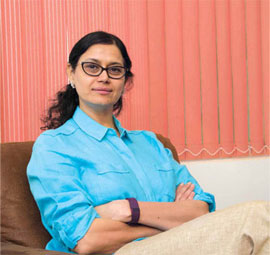
CII Eastern Region recently got its first woman at the helm when Jagi Mangat Panda, Managing Director of Ortel Communications Ltd, was elected Chairperson of the apex industry body’s eastern chapter for the year 2018-19. Jagi Panda, who is the co-founder of Ortel Communications Ltd, which has under its banner, Odisha’s No.1 TV channel, Odisha TV, holds a bachelor’s degree in biology and chemistry from Osmania University, Hyderabad. She also holds a master’s degree in Business Administration from the Indian Institute of Management, Ahmedabad. She was awarded and recognised as the ‘Young Global Leader’ at the World Economic Forum in 2008. She is married to noted politician Jay Panda who is also a leading industrialist of Odisha. She speaks at length to Corporate Citizen on her personal and professional journey. Read on…
Jagi Panda: I am a Punjabi but never lived in Punjab. I was born and brought up in Hyderabad. I am very South Indian at heart, and after my marriage to Jai, I go to Delhi often, but never lived there.
Just like any growing-up girl, when you are in college you participate in fashion shows and when you are appreciated, you get encouraged. When I was in Stanley Junior College, I won the Miss Stanley Contest. After that, I won the Miss Andhra Pradesh contest. With these two wins, I came into the limelight so a lot of people approached me for endorsements. This motivated me to go for outside modelling assignments. That’s how I got into professional modelling
No. In fact, they were very supportive no matter what I wanted to do. I used to play badminton for Andhra Pradesh but because I got enticed by this glamour world, I gave up badminton, which I occasionally regret. So, my next move was to move to Mumbai for better modelling opportunities.
No, actually, I want to correct you and though I have corrected this in many interviews, the stamp of me being the model of that advertisement, remains. And that’s unfair to the model who actually did the ad. I thought by now she would rectify it, since she has put in all the hard work, but she hasn’t. Amongst other ads, I did the Palmolive soap ad, which was a very large campaign in India, Bangladesh and Pakistan. The models comprised Aishwarya Rai, Shehnaz Treasurywala and myself. Strangely, people hardly remember this ad.
It was different from what I had expected. Everybody thinks it is a glamorous world and it is a smooth sailing. In actuality, it is a lot of hard work and nothing wrong with that—only people who choose this career will understand that it is not so easy in spite of the glamour.
The problem with this profession is that there are no definite working hours. Sometimes, I used to go early in the morning and would not return till midnight or even later. It would all depend on when the shoot would finish. You could be sitting for many hours, doing nothing and then suddenly do something and get delayed. This was something that was not very exciting for me.
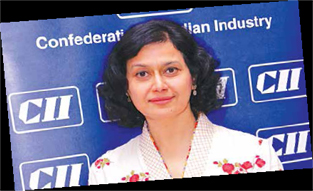
Modelling was so uncertain—sometimes you had work, sometimes there was no work at all. Being an outsider in Mumbai, there was nothing to do when I did not have a modelling assignment; I thought I needed to occupy myself with something else. So I applied for the Air India job and surprisingly got it. That was in 1989.
It was a brief stint, because I thought I could pursue my modelling assignments when I was not flying. However, after my training and a few flights, I was told that I cannot do modelling; so obviously I had to make a choice between the two careers. I quit Air India as obviously my first choice was modelling. I had won the Gadrags contest in India in 1990. Nasreen Wadia had sent me to Turkey for the best model contest. Subsequently, I joined an agency in Paris for modelling.
When I met Jay, both of us were on a flight to Paris. In fact, later we came to know that Sonia Gandhi was also on the flight (it was soon after Rajiv Gandhi’s assassination). There was a bomb scare so the aircraft was diverted to Ankara. We did not know each other on the flight at all. When we landed, they kept us on the ground for seven to eight hours until they searched the aircraft. The airport was so small and ours was a large aircraft, so some 300-odd passengers were accommodated in a small room. So, Jay and I came across each other and started making conversation. At that time Jay was looking after his father’s business. Subsequently, we kept meeting each other in Mumbai, Paris and other places. Finally, three years later, in 1994, we got married.
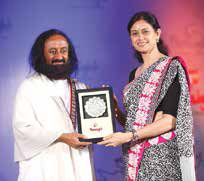 Felicitated
by Sri Sri Ravi
Shankar
Felicitated
by Sri Sri Ravi
ShankarWhen I first met him, I only knew that he was a businessman and I didn’t know anything else. I appreciated the fact that he was so well travelled, very well spoken and had great knowledge of many subjects. It is this that intrigued me because I hadn’t done any of that. His in-depth knowledge on so many subjects really attracted me to him.
He proposed two years after we saw each other and by then I obviously knew at some point we would marry. So I accepted his proposal and had absolutely no apprehension about leaving modelling. I had no apprehensions whatever until people started saying, ‘how will you go and live in a small place like Odisha?’ Many said, ‘No, you must go and check out the place’. I said no, because for me what was important was the guy I was getting married to, and not the place. I could be living in Hollywood and not have the right guy and what would it mean? So I did not really bother to check.
Yes, she was very supporting, very open minded and of very modern outlook I really admired that. Soon after Jay became a teenager, he started living on his own and not in his plush family house. So only a very modern mother could allow something like that. It was very easy therefore for me to get into the family. I had no idea what Odisha was like, otherwise. It was obviously not a very important State on the map of India. So, I came with a completely open mind.
I found professionalism was lacking here. So I learned that there is no point in being frustrated; you just have to work with what you have. Then I started working with Jay’s firm because I had told Jay that I didn’t care what place I was going to, as long as I was engaged in doing something. Since I had no technical qualifications, obviously Jay put me on a very low-end job. He said you have to grow on your own now. That’s when I went to IIM Ahmedabad and got an executive MBA degree. I came back and I was wanting to work on a new project. When I found that they were doing a communication project, I jumped at it. I was very excited about the project, but I told him I wouldn’t like to make it part of the group company - I would make it my company. Jay told me that was not so easy, you have to work very hard; you have to raise funds. I decided to take up the challenge and recruited four members in my team.
Yes, when we started the company, we wanted to have a satellite channel. But since the market of satellite channels had not picked up, we decided to launch a cable network, which I had never thought of. It was extremely challenging; in fact a nightmare for the first three years, but I am very stubborn—once I take up something, I just go at it.
There were so many problems in the cable business like dealing with cable operators, government agencies, the police and so on. I had not thought of all these problems - they came onto me and I didn’t know what hit me and somebody asked me if I would do it again, I said I don’t think so. So yes, we had a tough time for the first three to four years but luckily, a British firm was looking to invest in poor states like Odisha in the technology business and we actually fitted the bill, so we were very lucky. Thus, we got our first investment and we started from there.
After a few years of running Ortel, we started the TV channel, but initially it was a cable channel. Now, it is a full-fledged satellite channel for almost 14-15 years now. We got a lot of valuable support from Jay, because before he dabbled in his father’s business, he was a journalist in the USA for five years. He advised me that I must have a charter and ensure that everyone abides by it.
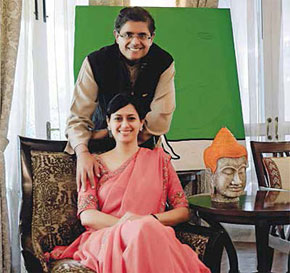 Jagi Panda
with her illustrious
husband, Jay Panda
who is a noted
political leader and
entrepreneur
Jagi Panda
with her illustrious
husband, Jay Panda
who is a noted
political leader and
entrepreneurYes, about media work ethics—how media should be balanced, you must cover at least two opposing viewpoints and things like that. That is the biggest gift that Jay gave us. We have firmly stuck to that charter and that has actually got us to come this far in terms of credibility. Today if you talk to any journalist, industrialist or common man, they will look up to Odisha TV because the credibility is very high. So, in the bouquet, the news channel is the premier channel, followed by entertainment, religion and so on.
Human resources was the major challenge. Handling people is another challenge because you have to get people a) to join you and b) to follow the charter. No editorial person is allowed to do space selling. So people did take some time because they had got used to working in a certain way, thanks to much of the media owed by politicians. To counter this, we got a lot of fresh talent who worked with an open mind.
The media today has a lot of power which they can use to actually keep democracy alive but unfortunately I see a lot of media working just the other way; they have become a hindrance to democracy. They are not doing what their job is—like speaking boldly, speaking freely. I think we must start using the power of media in the right, positive direction. My attitude is positive so I feel that things will turn out positive at the end of the day.
A marriage is an understanding between two people, not (defined) by how much time you spend with each other. Jay and I never had much time with each other because both of us had very different lives and stressful lives. In a month we spend at least a week together which is good, I think. What matters is how communicative you are and how you understand each other. Communication forms an extremely important part of marriage.
Very negative. I told him, oh no, I don’t think you should join politics.
"A marriage is an understanding between two people, not (defined) by how much time you spend with each other. What matters is how communicative you are and how you understand each other. Communication forms an extremely important part of marriage"
While he was in business, he had a lot of interaction with politicians whether he liked it or not, because government and politics are an integral part of doing business in India. So there was a certain amount of frustration in him. When he would express this feeling to his friends, they would always tell him that if he was so frustrated, why doesn’t he become a part of it, and that’s when he started getting involved with Biju Babu who had just become the CM. One thing led to another and he was asked to join the Rajya Sabha as a member. From Rajya Sabha he said I must now fight elections. So, it has been a gradual move for him.
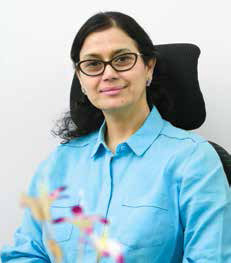
I have no working hours. However, earlier, I had no time at all when I was building the organisation. Now after many years I do get time for myself and I am able to do things I wanted to do. I have a good team, so that does help in getting home in time.
We do go for holidays, once a year. We love going to historical places, so Europe is a great place to be in. We sometimes go to the US and we never mix work and holiday. Initially, I did travel with him on a couple of work trips, but it doesn’t work like that.
We decided not to have kids. We decided this before we decided to get married, strangely both of us had this view that we won’t have kids of our own but we will adopt kids, but it is sad that we got so busy in our work that we never adopted.
In work my philosophy has always been that work is a journey; I don’t think we should be really working for goals; we should be working to enjoy the journey and that’s when we get out of this rat race we are constantly in.
You cannot control other people’s actions; you can only control your own actions and reactions, and you should be focusing on that.
I was worried how Jay would handle mainstream politics when he got into the Lok Sabha. However, I was surprised to see how very committed he is to his constituency. He spends 15 days in a month in his constituency. I have not heard of any politician at least in Odisha who spends that kind of time. In the morning his gates are open for anybody to walk in to talk to him and express his/her problems. This really amazes me.
By Vinita Deshmukh